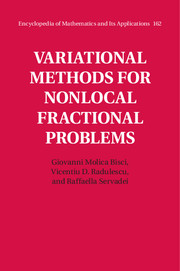Foreword
Published online by Cambridge University Press: 05 March 2016
Summary
Although fractional derivatives for functions of one variable can be traced to the origin of calculus and were already introduced rigorously in the nineteenth century by Liouville and Riemann, the development of linear and nonlinear equations involving fractional derivatives of functions of one or several variables, and in particular fractional Laplacians, is a more recent phenomenon.
Rich mathematical concepts allow in general several approaches, and this is the case for the fractional Laplacian, which can be defined using Fourier analysis, functional calculus, singular integrals, or Lévy processes. Its inverse is closely related to the famous potentials introduced by Marcel Riesz in the late 1930s. In contrast to the Laplacian, which is a local operator, the fractional Laplacian is a paradigm of the vast family of nonlocal linear operators, and this has immediate consequences in the formulation of basic questions such as the Dirichlet problem.
If the Laplacian has been and still is a stimulating cornerstone of the theory of linear partial differential equations and linear operators, the twentieth century has seen an increasing and outstanding activity in the study of the Dirichlet or other boundary value problems for nonlinear perturbations of the Laplacian and for its quasi-linear or fully nonlinear extensions. All techniques of nonlinear functional analysis, such as iterative, topological, monotonicity, or variational methods, have been essentially tested on those problems and have received, at this occasion, important developments.
It is therefore a natural question to see which results “survive” when the Laplacian is replaced by the fractional Laplacian. It is also a fruitful question because the extension of classical results to new situations also sheds light on a better and deeper understanding of the classical results.
Giovanni Molica Bisci, Vicenţiu Rădulescu, and Raffaella Servadei, the authors of this monograph, have all three, jointly or separately, contributed in a significant way to the use of modern critical point theory to nonlinear perturbations of a fractional Laplacian. But their monograph goes much beyond a presentation of their own results in book form. It starts with a substantial, clear, and systematic presentation of the fractional Sobolev spaces, where the considered problems will live, including the corresponding spectral theory. Then follows, for subcritical and critical perturbations, respectively, a panorama of how the methods of critical point theory apply successfully, at the expense of overcoming new technical difficulties, to many of the important problems considered in the Laplacian case.
- Type
- Chapter
- Information
- Variational Methods for Nonlocal Fractional Problems , pp. xiii - xivPublisher: Cambridge University PressPrint publication year: 2016



